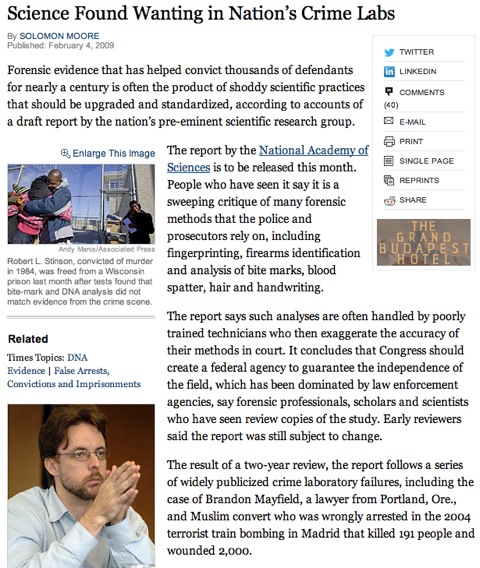More Trekkies
And the whole film appears to be on YouTube, too.
Hoop Dreams Update
Structure and Agency
Ethnography on the Radio
http://www.thisamericanlife.org
They have a podcast that iTunes says is the most popularly downloaded in the country.
Sporty Religious Pluralism
I have the Eagles-Steelers game on and I just saw this commercial and thought of what we learned a few weeks ago in ANTH 1010. Superstitions and/or religious pluralism in action in America!
Example Fieldnotes
More Sperm and Eggs
Religion and Fertility
I found this New York Times article last week right after I read the article for class about the maternity dispute in the Jewish religion. It is not quite on the same topic, but was still an interesting read that I thought you would enjoy!

The full article is here.
Randomness and Justice

Full article is here.
Celebration of "Their Eyes Were Watching God"
Professor Lisa Woolfork--Department of English
Professor Gertrude Fraser--Vice Provost for Faulty Recruitment and Retention
Professor Victor Cabas--Department of Rhetoric, Hampden-Sydney College
Professor Sabrina Pendergrass--Department of Sociology/ African American and African Studies
Kwame Holmes--Carter G. Woodson Institute, Post-Doctoral Fellow
Jason Saunders--Department of English Doctoral Student
Tuesday, September 18, 2012
4:30pm
125 Minor Hall
Light refreshments to follow in Minor Hall Lobby
Yanomami in the News

The full article is here.
UVA Anthro Society meeting
From: Richad Becker rzb4fe [at] virginia.edu
Hey all,
Virginia Anthropology Society (VAS) is putting on an info session for potential Anthropology majors on Monday, September 10 at 7 PM in Brooks Commons.
Brooks Hall is the out-of-place looking building behind the Rotunda, which is encountered as you walk towards the Corner, and also home to the Anthropology Department. Brooks Commons is the main room on the first floor, and quite hard to miss as it contains a giant cardboard mammoth inside.
Hope to see some of you there!
Richad
The Myth of Ownership: An Anthropologist Looks at the Corporate Share
Associate Professor of Anthropology
University of Virginia
August 31, 2012
Brooks Hall 2nd Floor Conference Room
1:00 P.M.-3:00 P.M.
Reception to follow in Brooks Hall Commons
Given the scale of attention paid to the stock market and the importance of stock investment in the economy, it is surprising how much mystification attaches to the question of what corporate stock is. The predominant view is that companies are owned collectively by the owners of the shares of their stock, and this principle forms the foundation of norms of corporate purpose that are widely taken for granted. But there is in fact no strong legal case for this view, and the evidence from the economicstructure of corporations is drawn solely from early stage firms and is contradicted in the case of the later stage public companies whose shares are traded on the main stock exchanges.
In this talk I explain the significance of our society's "mythic" construction of corporate share ownership. Its academic support comes from finance economics and reflects flawed, individualistic presuppositions regarding property ownership and the nature of corporate entities. An anthropological perspective, attuned to the specifics of social form and the historicity and reality of social formations, is needed to demystify the nature of corporate equity as a form of property, and to reveal the essentially political construction of its role in contemporary capitalism.

